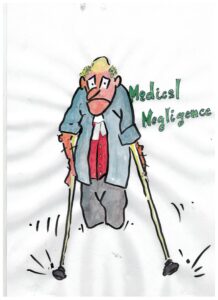Doctrine of Privity
- 2018-07-14
- By whiggs
- Posted in Contract Law, featured
The basic Doctrine of Privity is that only parties to a contract may enforce that contact and that a third person who is not a party to the contract may not, unless he can take advantage of one of the limited exceptions to the doctrine, enforce a contact to which he is not a party even if that contract is made for his benefit. For example, if A promises B that A will pay $100 to C if C performs a piece of work, C, having performed the relevant piece of work, cannot sue A for the $100. (Interestingly, in this example, B could also not compel A to pay the $100 to C as B has supplied no consideration for A’s promise unless the facts are such that B agreed to procure performance by C.
It is generally agreed that the modern doctrine of privity was established in 1861 in Tweddle v. Atkinson. In that case the fathers of a groom and bride, in pursuance of an oral contract made between the fathers before their children’s marriage, agreed together in writing to pay the groom, in one case £200 and in the other case £100, adding that the groom should have full power to sue them in any court of law for those sums. The bride’s father failed to pay and the groom, who was not a party to the contract between the fathers, sued the bride’s father for the payment promised by the bride’s father under the contract. The groom’s claim was dismissed on the basis that no stranger to a contract could take advantage of that contract even though made for his benefit.
The Doctrine of Privity was approved by the House of Lords in Dunlop Pneumatic Tyre Co. Ltd. v. Selfridge & Co. Ltd. in 1915 where Lord Haldane said:
“In the law of England certain principles are fundamental. One is that only a person who is a party to a contract can sue on it. Our law knows nothing of a jus quaesitum tertio arising by way of contract. Such a right may be conferred by way of property, as for example, under a trust, but it cannot be conferred on a stranger to a contract as a right to enforce the contract in personam”.
This, however, cut little ice with Lord Denning who made several attempts in the 1950’s to allow rights of suit by third party beneficiaries; despite this, however, the House of Lords reaffirmed the general Doctrine of Privity in Midland Silicones Ltd. v. Scruttons Ltd. (Lord Denning dissenting) in 1962.
WARNING: The Doctrine of Privity is an area of the law where concepts of equity or fairness have little or no standing whatsoever. If A promises B that if B (or C) will do something A will pay a cash sum to C there is no equity in the rule that says that C cannot enforce this promise; but that is currently the law so if you wish to confer an enforceable benefit on a stranger to a contract you must make use of one of the exceptions to the Doctrine of Privity and not simply rely on vague concepts of equity/clean hands and all that.
SEARCH BLOG POSTS
LATEST BLOG POSTS
- Updated product safety mandatory reporting guidance for suppliers now available
- Pleading fraud – cause and effect is essential
- Does the Trustee’s right of indemnity have priority over the right of beneficiaries in relation to assets?
- Rules of war (in a nutshell) | The Laws Of War
- MH370 Final Report
Past Blog Posts
- December 2021
- September 2021
- August 2021
- May 2021
- April 2021
- March 2021
- August 2020
- February 2020
- September 2019
- February 2019
- December 2018
- July 2018
- April 2018
- December 2017
- May 2017
- February 2017
- December 2016
- November 2016
- October 2016
- September 2016
- August 2016
- April 2016
- March 2016
- October 2015
- September 2015
- August 2015
- May 2014
- April 2014
- March 2014
- January 2014
Categories
- Appeals
- Artificial Intelligence
- Aviation law
- Banking and Finance Law
- Blogs
- Civil Liability Act
- Class Actions
- Coding for lawyers
- common law
- Consumer Claims (TPA)
- Contract Law
- Contractual Interpretation
- Criminal law
- Deeds
- Docassemble
- duty of care
- Engineering Law
- Equity
- Evidence
- Exclusion Clauses
- Execution of documents
- Expert Witness
- featured
- Financial Services
- Fraud
- Fundraising (Chapter 6D)
- General comment
- Home Building Law
- Insurance
- Legal drafting
- Local Court
- Medical Negligence
- MH370
- Motor Accidents
- Negligence
- Occupiers negligence
- Other
- Personal Injury
- Personal Property Securities (PPSA)
- Pleading
- Practice & Procedure
- Products Liability
- Property
- Real Property
- Reasons for a decision
- Securitisation
- Security (Mortgages & Charges)
- Sentencing
- Swaps & Derivatives
- Teaching
- Transactional Law
- Transfer of financial assets in transactions
- Trusts & Trustee Law
- Uncategorized
- War and Weaponry
- Witnesses
SEARCH BLOG POSTS
LATEST BLOG POSTS
- Updated product safety mandatory reporting guidance for suppliers now available
- Pleading fraud – cause and effect is essential
- Does the Trustee’s right of indemnity have priority over the right of beneficiaries in relation to assets?
- Rules of war (in a nutshell) | The Laws Of War
- MH370 Final Report
Past Blog Posts
- December 2021
- September 2021
- August 2021
- May 2021
- April 2021
- March 2021
- August 2020
- February 2020
- September 2019
- February 2019
- December 2018
- July 2018
- April 2018
- December 2017
- May 2017
- February 2017
- December 2016
- November 2016
- October 2016
- September 2016
- August 2016
- April 2016
- March 2016
- October 2015
- September 2015
- August 2015
- May 2014
- April 2014
- March 2014
- January 2014
Categories
- Appeals
- Artificial Intelligence
- Aviation law
- Banking and Finance Law
- Blogs
- Civil Liability Act
- Class Actions
- Coding for lawyers
- common law
- Consumer Claims (TPA)
- Contract Law
- Contractual Interpretation
- Criminal law
- Deeds
- Docassemble
- duty of care
- Engineering Law
- Equity
- Evidence
- Exclusion Clauses
- Execution of documents
- Expert Witness
- featured
- Financial Services
- Fraud
- Fundraising (Chapter 6D)
- General comment
- Home Building Law
- Insurance
- Legal drafting
- Local Court
- Medical Negligence
- MH370
- Motor Accidents
- Negligence
- Occupiers negligence
- Other
- Personal Injury
- Personal Property Securities (PPSA)
- Pleading
- Practice & Procedure
- Products Liability
- Property
- Real Property
- Reasons for a decision
- Securitisation
- Security (Mortgages & Charges)
- Sentencing
- Swaps & Derivatives
- Teaching
- Transactional Law
- Transfer of financial assets in transactions
- Trusts & Trustee Law
- Uncategorized
- War and Weaponry
- Witnesses




